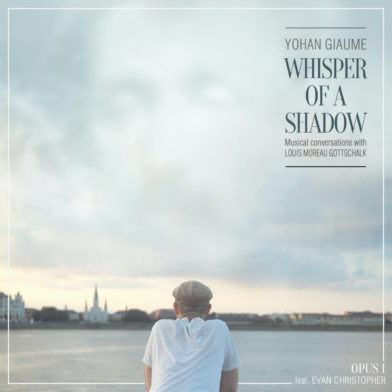Trumpeter Yohan Giaume has reached well into the pre-jazz past to put a very personal modern stamp on the musical tradition that is so much the lifeblood of New Orleans. His primary inspirations were the life and work of pianist-composer Louis Moreau Gottschalk. The Crescent City native (1829-1869) absorbed a variety of Afro-Creole and Latin American rhythms and folk songs to craft distinctive romantic chamber music.
On Whisper of a Shadow, Opus 1, Parisian musician and composer Giaume put a couple of Gottschalk melodies, and eight of his own inspirations, in a creative jazz context exploring the circle of life through music and the spoken word. His mighty band includes clarinetist Evan Christopher (the session’s principal soloist), pianist Aaron Diehl, drummer Herlin Riley, bassist Roland Guerin, spoken-word poet Chuck Perkins, and a French string quartet. Trumpeter Nicholas Payton is special guest on three tracks.
The recording begins with two Gottschalk pieces that Giaume tweaked and extended. His re-creation of “Le Poète Mourant” (The Dying Poet) never strays far from the composer’s enduring melody. It showcases the moody side of Christopher’s clarinet sound, with Giaume following on trumpet. The musical texture of Gottschalk’s piece “The Banjo” is a background for “Mascarade.” The string quartet plays the bouncy foundation for Perkins’ words that explore the pain and anger hidden behind the smiles of post-slavery Blacks. Riley’s drumming underscores its tone.
Giaume’s arrangement of the traditional song “Lisette” reveals a romantic ballad that turns wistful at times through Christopher’s extended solo. This piece, also featuring strings and piano, originally was “Lisette Quitté la Plaine,” which dates to 18th century French vaudeville operettas. In dark contrast, “Cold Facts” presents Perkins’ sobering and somber poem over music. It is rooted in the Easter 1873 Colfax massacre in central Louisiana, which has been described as the worst instance of racial violence during Reconstruction. In Perkins’ telling: “Baptized by the crimson blood of freedom seekers, it marked the end of carpetbaggers’ misrule. Three [whites] died fighting white supremacy, 150 [Blacks] died fighting to live.” Sad to say, the message remains relevant in 21st-century America.
Giaume’s “The Promise of Dawn” is a musical yearning for a better day and signals a turning point in the session. Showcasing Christopher, Payton and the strings, the solos reflect this composer’s optimism. With Perkins narrating his poetry over Diehl’s spare piano, “Bamboula Dreams, Part 1” imagines Congo Square in the 19th century, with dancing and musical celebrations set to the bamboula and other African rhythms. The instrumental portions here and on “Bamboula Dreams, Part 2” reflect the vitality of an unconquered spirit. They also set the stage for Giaume’s “Lez African É Là,” which to my ears is the project’s centerpiece.
The composer was inspired by the sound of another old Afro-Creole folk melody “Quan Patate La Cuite,” which Gottschalk used in his own composition “Bamboula.” Featuring drums and a chanting choir, “Lez African É Là,” honors the enslaved who gathered on Sunday afternoons in Congo Square in Gottschalk’s era. With lyrics by Bruce “Sunpie” Barnes sung by percussionist Philippe Makaīa, it captures the joyous spirit of those gatherings.
The final three tracks explore the cycle of life and death exemplified by the traditional New Orleans jazz funeral parade. The string quartet underscores the mournful nature of “Life Circle, Part 1” (Death) as the brass band heads to the cemetery. Giaume based the melody on a vintage Gottschalk lament “Morte!! (She is dead).” Diehl sets the thoughtful tone before the full brass band enters and Payton’s growling, wailing trumpet work soars above all. An interlude, Perkins’ poem “The Passage,” sums everything up. He writes/narrates that there is no finality in death, which he calls “a mere cog in the cycle of life.” Death brings one to “the bosom of ancestors,” he says. “We all experience death, but we will never die.” With more Perkins lyrics, “Life Circle, Part 2” (Birth) documents the spirit of the post-burial Second Line celebration. With swinging solos by Payton, Christopher and Riley at the drums, it captures all the celebratory joy of a life lived full.




